 Petzlover
Petzlover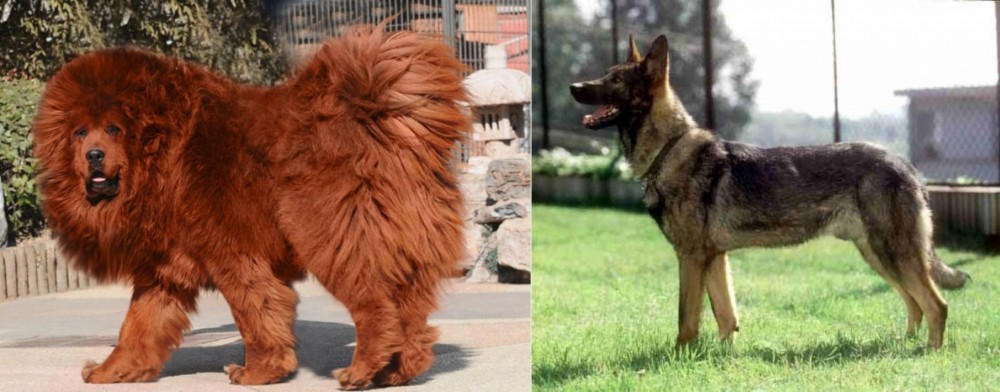 Himalayan Mastiff is originated from India but Kunming Dog is originated from China. Both Himalayan Mastiff and Kunming Dog are having almost same height. Himalayan Mastiff may weigh 40 kg / 89 pounds more than Kunming Dog. Both Himalayan Mastiff and Kunming Dog has almost same life span. Both Himalayan Mastiff and Kunming Dog has almost same litter size. Both Himalayan Mastiff and Kunming Dog requires Moderate Maintenance.
Himalayan Mastiff is originated from India but Kunming Dog is originated from China. Both Himalayan Mastiff and Kunming Dog are having almost same height. Himalayan Mastiff may weigh 40 kg / 89 pounds more than Kunming Dog. Both Himalayan Mastiff and Kunming Dog has almost same life span. Both Himalayan Mastiff and Kunming Dog has almost same litter size. Both Himalayan Mastiff and Kunming Dog requires Moderate Maintenance.
 The Himalayan Mastiff or Tibetan Mastiff is an ancient breed. Bred to be guardians of the flock, they could take care of leopards and wolves or anything else that tied to hurt the flock. The Himalaya Mastiff is found in the Himalayan area of Tibet. They are descendants of the Tibetan dogs that developed almost any Mastiff or Molosser on earth. They may have been in the mountains since the early 1100 BC. and have been fairly isolated. It was in this isolation that the Himalayan Mastiff developed.
The Himalayan Mastiff or Tibetan Mastiff is an ancient breed. Bred to be guardians of the flock, they could take care of leopards and wolves or anything else that tied to hurt the flock. The Himalaya Mastiff is found in the Himalayan area of Tibet. They are descendants of the Tibetan dogs that developed almost any Mastiff or Molosser on earth. They may have been in the mountains since the early 1100 BC. and have been fairly isolated. It was in this isolation that the Himalayan Mastiff developed.
Their function at that time was mostly to guard property. In some circumstances an entire village is guarded by one dog. It was also during this period that the breed was taught to be aggressive by tying them up as puppies. They guarded families while the men moved the village flock higher up in the mountains. They stayed in isolation until the mid-1800’s when the Queen of England was given a Himalayan Mastiff. For thousands of years, this dog was a nomad.
Soon the breed was being exported to England. A standard was developed, and the British began to breed them. Next, they were exported to Nepal, Afghanistan, India and the United States. They are rare in Tibet these days but more popular than ever in England and the United States. The first American Himalaya Tibetan Mastiff Association came into being in 1974 and in 2006 it was recognized by the AKC.
Today in the West, the Himalayan is a domesticated, family dog. It hardly fits in an apartment of course. These new western Himalayan Mastiffs are more easy- going than the Tibetan ones, but they are still wary of strangers and somewhat aloof. They are also still very protective and nocturnal. They are smart, independent and stubborn. They are not easy to train but socialization and obedience training is essential.
A study done in 2011 showed that it is very likely that many large breed dogs were descended from this Mastiff. This includes the St. Bernard, the Rottweiler, Bernese Mountain Dog and the Great Pyrenees. Later studies showed that the Mastiff’s ability to survive in the rare air of the Himalayans was due to interbreeding with Tibetan wolves in ancient, prehistoric times. Now they are competing in the Westminster Kennel Club Dog Show.
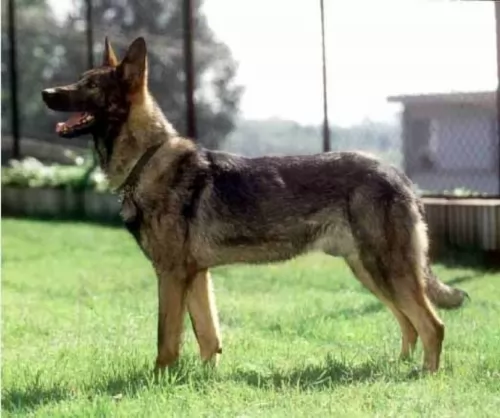 Known also as the Kunming Wolfdog, the Kunming Dog is similar in looks to the German Shepherd Dog, but the coat is recognizably shorter.
Known also as the Kunming Wolfdog, the Kunming Dog is similar in looks to the German Shepherd Dog, but the coat is recognizably shorter.
It’s an attractive looking wolf-like dog which comes from China. It isn’t quite clear which dog breeds were used in the gene pool for these Kunming wolfdogs. You can see though that the German Shepherd as well as other wolfdog-crosses have played a part in the breed's origin.
The dog was created in the early 1950s for military- and guard dog purposes. In 1988, the Chinese Public Security Bureau officially recognized the Kunming Dog as a breed. Today, the dog is still used in military and police services.
 The Himalayan Mastiff is a giant, massive dog longer than it is tall. The breed has a heavy, broad head and square muzzle. They have black noses, a level bite and almond shaped, slanted, deep set eyes. They are brown, and the ears hang close to the head. They are heavy, muscular and sturdy. They have a feathered tail curving over their back. With a heavy, thick double coat and mane they resemble a lion at times. The coat can be brown, black, and gray-blue with gold or tan markings. These are impressive and noble dogs, athletic, with cat like feet. They are agile and light on their feet.
The Himalayan Mastiff is a giant, massive dog longer than it is tall. The breed has a heavy, broad head and square muzzle. They have black noses, a level bite and almond shaped, slanted, deep set eyes. They are brown, and the ears hang close to the head. They are heavy, muscular and sturdy. They have a feathered tail curving over their back. With a heavy, thick double coat and mane they resemble a lion at times. The coat can be brown, black, and gray-blue with gold or tan markings. These are impressive and noble dogs, athletic, with cat like feet. They are agile and light on their feet.
According to some breeders there are two different kinds or types of Himalayan Mastiff. These are the Tsang-khyi or the monastery mastiff type and the Do-khyi or the nomad mastiff type. The monastery is a heavier, taller dog who face is very wrinkled while the nomad is a leaner dog with less facial wrinkles. In any litter there can be both kinds. The kind of work that was given to each dog was dependent on their type. The Monastery kind is given stationary jobs and the nomad kind got the active jobs.
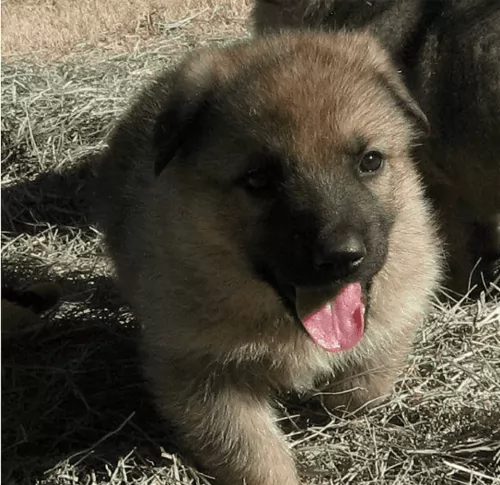 The Kunming is a large dog, athletic and muscular, standing at 60 – 68cm and weighing 30 – 38kg. They are dogs which fall under the Spitz type category.
The Kunming is a large dog, athletic and muscular, standing at 60 – 68cm and weighing 30 – 38kg. They are dogs which fall under the Spitz type category.
The dog has a coat which is considered seasonal - double layered in the cooler months and shedding to a shorter coat in the hotter months. The thick coat can be a light tan color to white and he has a black saddle pattern, giving the dog an overall black and tan combination.
The bushy tail is long and its carried down and low except when the dog is excited and alert, then it lifts its tail. The ears are erect like that of the German Shepherd or Wolf.
He isn’t the best breed for a first time owner as he is very strong willed and can tend to become aggressive. It is why he has been used to perform tasks in the military.
These dogs are known for their alertness, and to keep him mentally balanced and amicable, he will need a strong, firm owner who is also fair, patient and consistent. Bored and frustrated, a Kunming can become unpredictable and a first time dog owner might not be able to cope with such an independent, strong-willed, determined, confident dog.
He is also energetic and intelligent, making a great family dog as he is loyal, loving and devoted. His intelligence allows him to learn easily too. Training and socialization will be required if you want him to be obedient.
He is adaptable and can adjust to life in the city or the countryside, but essentially he is better suited to a home with large grounds as he is a dog which is full of energy.
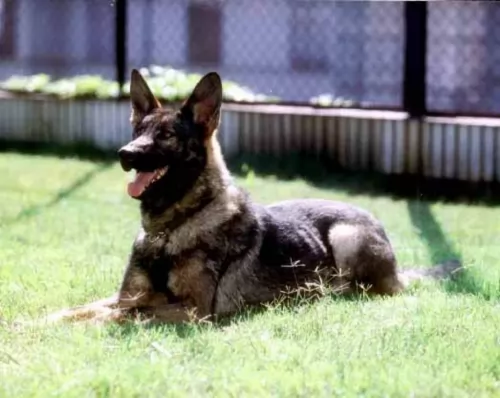 Your attractive Kunming dog is an energetic, lively dog who is going to require a good deal of exercise as he was developed to be a working dog.
Your attractive Kunming dog is an energetic, lively dog who is going to require a good deal of exercise as he was developed to be a working dog.
They are loving towards their human families and even well behaved with other dogs in the family. He will however need socialization and training from a firm, fair, consistent owner.
Provide him with a loving environment, lots of exercise, wholesome food, a warm, dry place to sleep and lots of mental and physical stimulation, and you’ll have a wonderful, contended pet and companion.
 Being a large breed of canine, the Himalayan Mastiff has some of the typical health issues of large dogs. However, they also face a serious genetic disorder as well.
Being a large breed of canine, the Himalayan Mastiff has some of the typical health issues of large dogs. However, they also face a serious genetic disorder as well.
Canine Inherited Demyelinative Neuropathy (CIDN) – a fatal disorder seen in puppies by seven weeks of age. Puppies die before they are 5 months old.
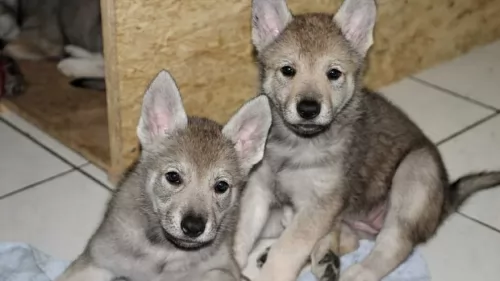 Your Kunming can reach 12 to 14 years of age if he is loved, fed correctly and adequately exercised. Just as with any dog, he can be susceptible to some of the common dog illnesses. These include the likes of hip dysplasia, bloat, epilepsy, eye problems, ear infections, intestinal parasites, heart disease and skin problems.
Your Kunming can reach 12 to 14 years of age if he is loved, fed correctly and adequately exercised. Just as with any dog, he can be susceptible to some of the common dog illnesses. These include the likes of hip dysplasia, bloat, epilepsy, eye problems, ear infections, intestinal parasites, heart disease and skin problems.
Worms are a chronic problem in dogs and the thing is, they can infect humans too. If you don’t treat worms in your dog, it can lead to your pet becoming seriously ill. You may notice loss of appetite, a dull, thinning coat, anemia and diarrhea.
The vet will be able to offer a treatment that can help with eradicating hook-, round- and tapeworms.
This may sound like a mild dog disease but it can cause a lot of misery for your pet. You’ll notice your pet licking, scratching and biting at raw, red spots on his skin. With bacterial- or yeast infections, your pet can battle with itchiness, pain and discomfort. Luckily your vet can recommend treatments to effectively alleviate symptoms.
 This breed will eat less than you think they should but don’t overfeed. Puppies need a solid dry food for large dogs. You can free feed 1 cup three times per day.
This breed will eat less than you think they should but don’t overfeed. Puppies need a solid dry food for large dogs. You can free feed 1 cup three times per day.
For dogs over a year old you can free feed anywhere from two to four cups of dry food per day. Unlike many other breeds, the Himalaya Mastiff will only eat when hungry and they may not eat more than once a day. They will not overeat. The males might not eat at all when females are in season if they are around them.
They have good strength and athletic ability.
The Himalayan Mastiff needs regular, routine walks. It is important during these walks that the human leads the way, or the dog heals. Do not overwork a young Himalayan Mastiff. They need work related jobs like structured play time, walking the boundary of their territory, playing frisbee or catch. They work and play in short bursts then rest.
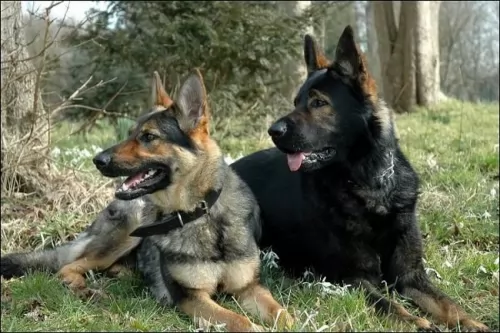 Grooming for the thick coat should be done regularly. The dog sheds quite a bit and seasonally and you'll want to brush him twice a week to rid the coat of those loose hairs.
Grooming for the thick coat should be done regularly. The dog sheds quite a bit and seasonally and you'll want to brush him twice a week to rid the coat of those loose hairs.
The Kunming Dog is high energy and will therefore suit a family who is active and sporty. He is the kind of dog that you can include in all your activities – walks, hikes, running next to you when you go cycling and swimming.
This is an active dog and you want the best food for him, packed with vitamins and minerals to keep him lively and energetic. Instead of giving him one large meal a day that he gulps down quickly, split his food into 2 smaller meals.
Your dog’s age, his breed and his energy levels will direct you as to how to feed him.
Remember, that although commercially manufactured dog foods need to comply with certain standards, it doesn't guarantee their goodness. It may not be digestible for your pet. If you want to use one of these foods, choose the best there is and try to mix in some wholesome home-made food from time to time.
Cooked chicken, brown rice or pasta and some raw or cooked vegetables can be excellent for him as well as adding in some raw meat occasionally.